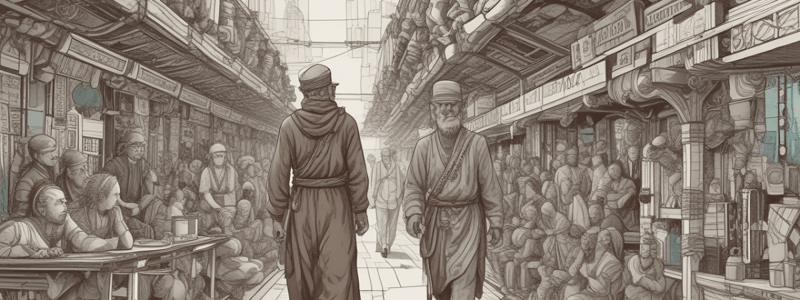Podcast
Questions and Answers
What is the physical phone analogous to in the context of sociology?
What is the physical phone analogous to in the context of sociology?
- Culture
- Society (correct)
- Software
- Human ideas
What happens to culture from one generation to the next?
What happens to culture from one generation to the next?
- It is erased
- It is learned, transmitted, and reshaped (correct)
- It is lost
- It remains the same
What is the role of human ideas in culture?
What is the role of human ideas in culture?
- They are small and insignificant
- They are only found in physical phones
- They are big and allow society to work (correct)
- They are only found in software
What is the relationship between society and culture?
What is the relationship between society and culture?
What do apps represent in the context of sociology?
What do apps represent in the context of sociology?
What is culture generally referred to?
What is culture generally referred to?
What is an example of an institution in society?
What is an example of an institution in society?
What is the relationship between culture and society?
What is the relationship between culture and society?
What is the analogy used to describe the relationship between society and culture?
What is the analogy used to describe the relationship between society and culture?
What is the main difference between culture and society?
What is the main difference between culture and society?
What do apps on a phone represent in the context of sociology?
What do apps on a phone represent in the context of sociology?
What is the main function of culture in society?
What is the main function of culture in society?
What are the two main components of a phone that can be compared to sociology?
What are the two main components of a phone that can be compared to sociology?
What is the result of a society without culture?
What is the result of a society without culture?
What is the primary reason why a phone is unable to function without apps?
What is the primary reason why a phone is unable to function without apps?
How do the updates to apps on a phone relate to the concept of culture in sociology?
How do the updates to apps on a phone relate to the concept of culture in sociology?
What is the key aspect of human ideas in culture that makes society functional?
What is the key aspect of human ideas in culture that makes society functional?
What is the main difference between the phone's physical structure and the apps on the phone in the context of sociology?
What is the main difference between the phone's physical structure and the apps on the phone in the context of sociology?
Flashcards are hidden until you start studying
Study Notes
Culture and Society
- Culture is a way of life shared by a group of people, encompassing knowledge, beliefs, and values that bind a society together.
- Culture is diverse and includes aspects like artwork, language, and literature.
- It provides guidelines for living and allows individuals to gain meaning from objects and ideas around them.
Society
- Society refers to the way people organize themselves, usually in a specific geographic area, with interactions among themselves more frequent than with outsiders.
- Society shares a common culture over time.
Relationship between Culture and Society
- Culture can be thought of as the rules that guide people's lives, while society is the structure that provides organization for people.
- To understand this relationship, consider a phone as a metaphor: society is like the phone's hardware (physical device), and culture is like the software (collection of instructions and code).
Institutions in Society
- Society includes key parts called institutions, such as family, education, and politics, which meet basic human needs and can be thought of as the hardware.
Culture as Software
- Culture is constantly being updated, similar to how apps on a phone are updated with new features or bug fixes.
- Culture is learned, transmitted, and reshaped from generation to generation.
- Human ideas from culture are what allow society to work, just as apps make a phone useful.
Key Takeaways
- Society is just organized groups of people, while culture is their way of life.
- These two concepts are not the same thing, but they cannot exist without each other.
- Just as a phone cannot function without apps, society cannot function without its culture.
Culture and Society
- Culture is a way of life shared by a group of people, encompassing knowledge, beliefs, and values that bind a society together.
- Culture is diverse and includes aspects like artwork, language, and literature.
- It provides guidelines for living and allows individuals to gain meaning from objects and ideas around them.
Society
- Society refers to the way people organize themselves, usually in a specific geographic area, with interactions among themselves more frequent than with outsiders.
- Society shares a common culture over time.
Relationship between Culture and Society
- Culture can be thought of as the rules that guide people's lives, while society is the structure that provides organization for people.
- To understand this relationship, consider a phone as a metaphor: society is like the phone's hardware (physical device), and culture is like the software (collection of instructions and code).
Institutions in Society
- Society includes key parts called institutions, such as family, education, and politics, which meet basic human needs and can be thought of as the hardware.
Culture as Software
- Culture is constantly being updated, similar to how apps on a phone are updated with new features or bug fixes.
- Culture is learned, transmitted, and reshaped from generation to generation.
- Human ideas from culture are what allow society to work, just as apps make a phone useful.
Key Takeaways
- Society is just organized groups of people, while culture is their way of life.
- These two concepts are not the same thing, but they cannot exist without each other.
- Just as a phone cannot function without apps, society cannot function without its culture.
Culture and Society
- Culture is a way of life shared by a group of people, encompassing knowledge, beliefs, and values that bind a society together.
- Culture is diverse and includes aspects like artwork, language, and literature.
- It provides guidelines for living and allows individuals to gain meaning from objects and ideas around them.
Society
- Society refers to the way people organize themselves, usually in a specific geographic area, with interactions among themselves more frequent than with outsiders.
- Society shares a common culture over time.
Relationship between Culture and Society
- Culture can be thought of as the rules that guide people's lives, while society is the structure that provides organization for people.
- To understand this relationship, consider a phone as a metaphor: society is like the phone's hardware (physical device), and culture is like the software (collection of instructions and code).
Institutions in Society
- Society includes key parts called institutions, such as family, education, and politics, which meet basic human needs and can be thought of as the hardware.
Culture as Software
- Culture is constantly being updated, similar to how apps on a phone are updated with new features or bug fixes.
- Culture is learned, transmitted, and reshaped from generation to generation.
- Human ideas from culture are what allow society to work, just as apps make a phone useful.
Key Takeaways
- Society is just organized groups of people, while culture is their way of life.
- These two concepts are not the same thing, but they cannot exist without each other.
- Just as a phone cannot function without apps, society cannot function without its culture.
Studying That Suits You
Use AI to generate personalized quizzes and flashcards to suit your learning preferences.




